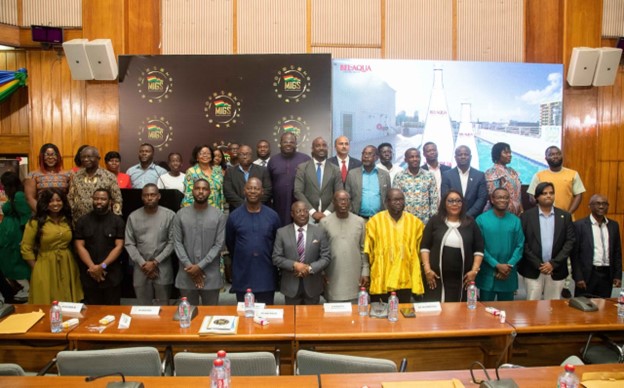Business leaders have stressed the need for deliberate and strategic public-private partnerships (PPP) to stimulate growth in key sectors of the economy.
They emphasised that PPPs are key to accelerating the country’s digital transformation agenda. Currently, efforts are underway to digitise government services, build a biometric national identity register, deploy a digital property addressing system, mobile money interoperability and institutionalise paperless port operations, among others. All these initiatives, they asserted, require strategic PPPs to yield the right results.
Buttressing their point at the Made in Ghana Summit in Accra, leaders from both the public and private sectors including Registrar of Companies at the Office of the Registrar of Companies, Jemima Oware; Senior Policy Advisor to the Vice President, Professor Kwaku Appiah-Adu; Commissioner-General at Ghana Revenue Authority, Rev. Dr. Ammishaddai Owusu-Amoah; and Chief Executive Officer-Ghana Chamber of Telecommunications, Dr. Kenneth Ashigbey, stressed that PPPs, if prioritised, can form the cornerstone of a successful move to digitisation and an effective strategy for bringing together the resources and technical expertise needed to deliver on digital transformation goals.
This is particularly crucial to leverage digitisation across multiple sectors such as agriculture, health, transport, energy, education among others, for measurable outcomes.
Organised by the Entrepreneurs Foundation of Ghana (EFG), the Made in Ghana Summit was themed ‘The role of public-private partnership in sustainable digital transformation, to promote Ghana’s digitalisation and industrialisation in the digital economy’.
Registrar of Companies at the Office of the Registrar of Companies, Mrs. Oware, noted that PPPs allow the strength and resources of both sectors to be leveraged while offering a collaborative framework that harnesses collective strength to address societal challenges, foster innovation and ensure digital advancement benefits all parts of society.
She added that well-thought-out PPPs play a critical role in driving sustainable digital transformation; and with effective collaboration to achieve sustainable and impactful outcomes, Ghana can create an environment conducive to entrepreneurship, attract investments and position itself as a competitive destination for businesses.
For his part, Senior Policy Advisor to the Vice President, Professor Kwaku Appiah-Adu, indicated that: “A successful and sustainable large-scale digital transformation requires more than quick fixes to faulty systems – it requires stronger collaborations and long-lasting partnerships between public organisations and private ones. Digital systems can help scale and manage online tax collection, predict fraud and deploy analytics for improved service delivery”.
He added that in tandem with driving technological innovations, PPPs can help unlock vital upskilling, reskilling and digital literacy initiatives.
“I am confident that PPPs can improve digitalisation of the economy and governments through collaborations that combine innovative efforts from the private sector, forward-thinking policies from governments, support from academia and encouragement from civil society actors and organisations,” he said.
Commissioner-General at Ghana Revenue Authority, Rev. Dr. Ammishaddai Owusu-Amoah, in a statement presented on his behalf also added his weight to the call – saying that to build a more robust, resilient and prosperous Ghana, PPPs cannot be underestimated.
With a focus on the financial landscape and digitisation, he said: “In today’s interconnected world, efficient and transparent revenue administration hinges on seamless system integration between financial institutions, taxpayers and revenue authorities. This integration offers numerous benefits, enhancing both collection of revenue and the overall experience for taxpayers”.
Socioeconomic gaps
For his part, Chief Executive Officer-Ghana Chamber of Telecommunications, Dr. Ing. Kenneth Ashigbey raised a strong concern – pointing out that while it is important to acknowledge digital technology can bring tremendous opportunities – like accelerating progress toward achieving the Sustainable Development Goals (SDGs), it can also widen socioeconomic gaps if the country does not make the effort to ensure the issue of access to connectivity is not only dealt with but also that it deals with issues of usage.
He expatiated that: “We need to carry all along and ensure that those who lack Internet connectivity gets it – with affordable devices and provision of skills needed to benefit from digital services.
“To leverage the great potential of digital for development and leave no one behind, we need to make an intentional effort to steer technology development and national digital transformation in a direction that is both inclusive and sustainable”.
He further underscored the need to take intentional strategic steps that ensure the country stops being a consumer of technology and starts also producing technology and influencing how it’s used to solve contextual challenges.
“We should stop calling our real sector the derogatory word ‘informal’. We should rather exploit ways in which we can use technology to make our ways of doing business – the micro, small and medium enterprises – more productive and efficient,” he added.
Executive Secretary-National Identification Authority, Prof. Kenneth Agyemang Attafuah Esq., also added that the journey toward sustainable digital transformation requires commitment to a shared vision, strong political will to support PPPs, periodic technological upgrades to avoid technical obsolescence, and adoption of an effective framework agreement for continuous knowledge-transfer.
Others, including CEO-Food and Drugs Authority (FDA), Mrs. Delese Mimi Darko; Dr. John Ofori-Tenkorang, Director-General-Social Security & National Insurance Trust; and Chairman-Margins ID Group, Moses Baiden Jnr, also shared their thoughts on the essence of PPPs – illustrating the progress and positive impacts it has had on their operations and advocating it for socio-economic growth.
The Made-in-Ghana Summit 2023 assembled influential public and private sector chief executives, captains of industries, business leaders, development partners, diplomatic corps, policymakers and entrepreneurs on one platform to promote and discuss Ghana’s digitalisation, industrialisation and business development agenda.










